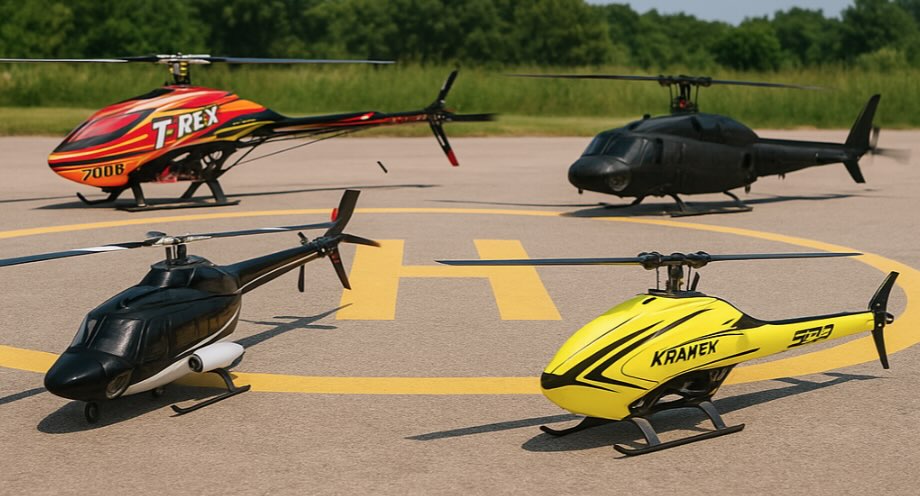Did you know flying RC helicopters regularly is only a fun hobby for adults, it can actually sharpen your mental skills? If you are looking for a serious hobby grade helicopter, read on.
If you’re thinking about getting into flying RC helicopters for fun, entertainment, or even to get involved in competitions, you want a high-quality product you can trust. If you want a cheap product that breaks after a few uses, this might not be the article for you.
The good news is technology has taken hobby grade RC helicopters to new heights, literally. You will find RC helicopters in our writeup with fantastic lift heights, incredible maneuverability, farther ranges, and longer battery life than ever before.
The Best Models of 2025
When it comes to high-end RC helicopters for adults, the market isn’t just about flashy looks. These helis deliver serious power, realistic scale details, and cutting-edge flight control tech.
Whether you’re into 3D aerobatics, scale realism, or want the biggest and baddest bird at the flying field, the picks below cover a range of flying styles and preferences.
Before we break down each model in detail, here’s a quick comparison to help you get a feel for their capabilities:
| Model | Rotor Diameter | Flight Time | Price |
|---|---|---|---|
| Airwolf FW450 V3 | 790 mm | 8–12 min | $730 |
| Align T-REX 700X | 1582 mm | 4–6 min | $1,300 |
| SAB Goblin Kraken 580 | 1320 mm | 5–7 min | $900 |
| Roban UH-60 Black Hawk | 1580 mm | 6–8 min | $2,300+ |
| Blade Fusion 550 BNF | 1245 mm | 5–7 min | $700 |
| Huey UH-1 V4 | 780 mm | 10 min | $800 |
Each of these helis offers a unique experience, and what’s “best” really comes down to what kind of flying you’re into—and how much build work you’re ready to take on. Let’s dig into each one.
1. FLYWING Airwolf FW450 V3
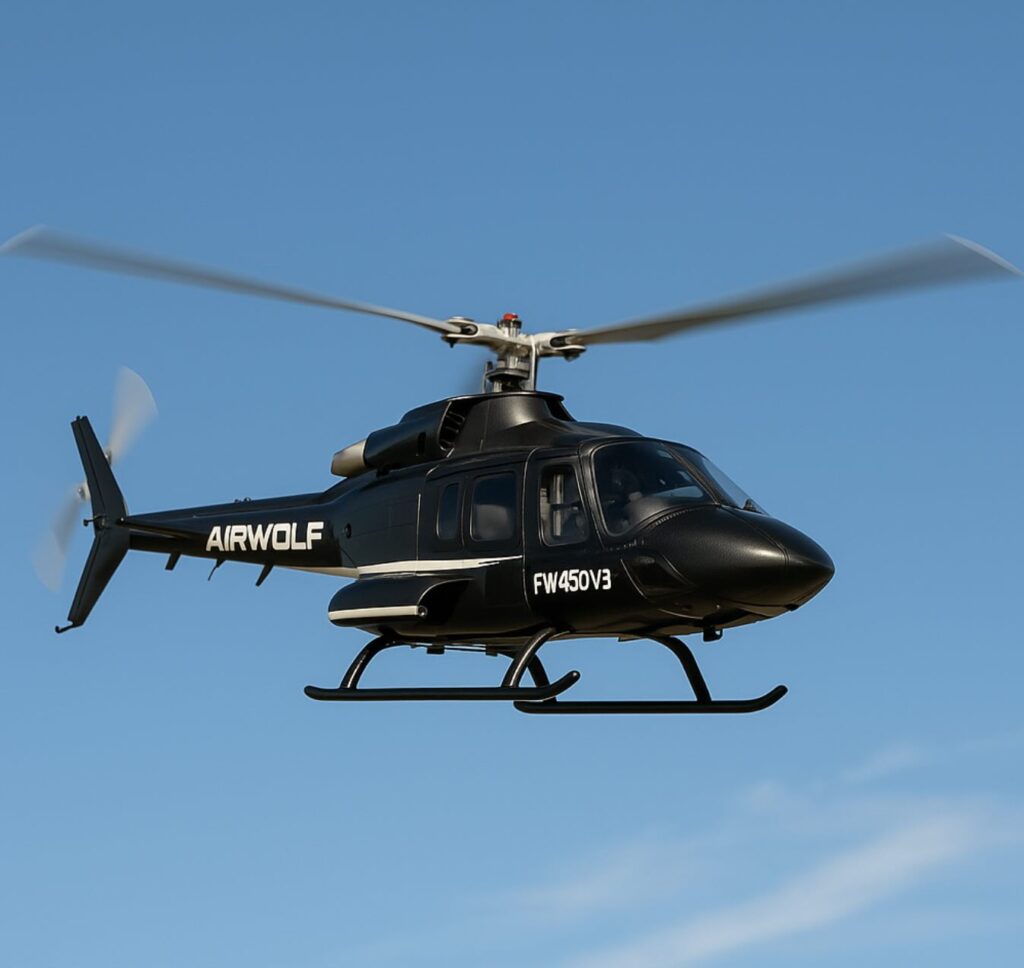
This scale Airwolf replica mixes movie looks with modern tech. Switch on GPS and it will park in a steady hover or auto return if you lose orientation.
| Key Spec | Detail |
|---|---|
| Ready-to-fly | Yes, includes GPS rescue |
| Rotor diameter | 790 mm |
| Battery | 6 S 2600 mAh LiPo |
| Flight time | 8–12 min per pack |
| Weight | 1350g without battery |
The full-len fuselage hides a robust carbon frame, and the included flight controller can flip from beginner stability to full 3D agility with a single switch
Pros
- True scale body with retract gear and lighting
- GPS rescue takes anxiety out of first flights
- Six channel transmitter supports stunt mode later
Cons
− Fiberglass fuselage needs careful landings
− Shorter flight time unless you carry multiple packs
2. Align T-REX 700X Dominator
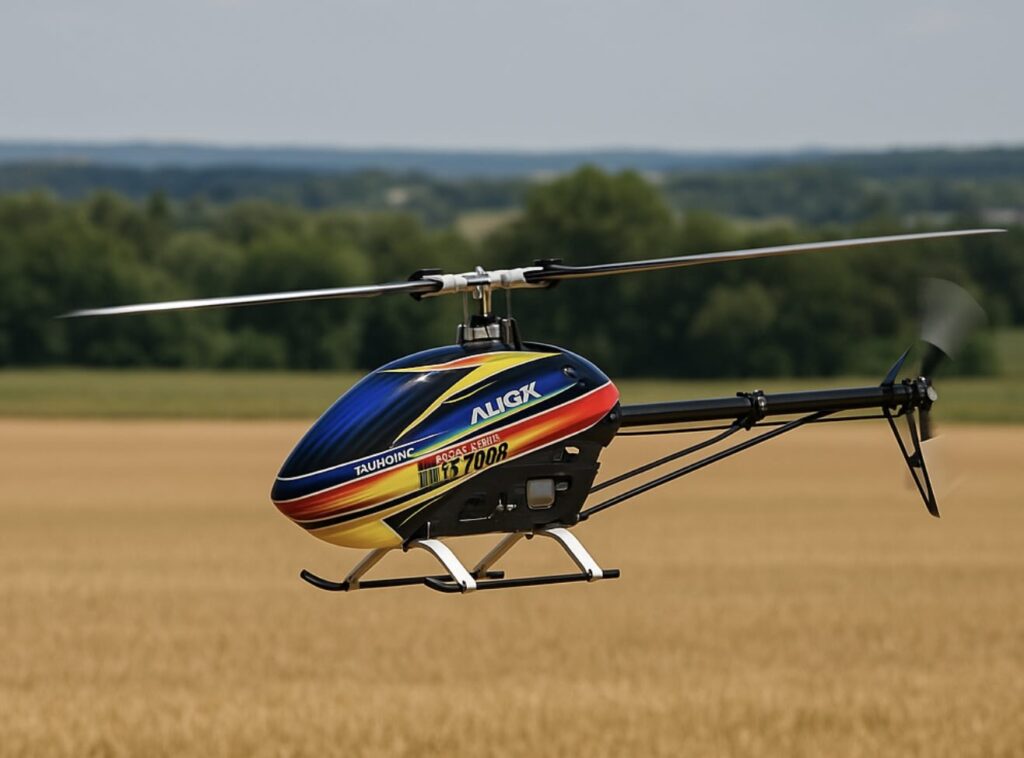
The big Align is the benchmark for pro pilots who crave raw power and precision. Carbon side frames, helical main gear, and a monstrous 750 MX motor give punchy climbs and crisp stops.
| Key Spec | Detail |
|---|---|
| Ready-to-fly | Kit with motor, ESC, servos, blades |
| Rotor diameter | 1582 mm |
| Battery | 12 S 5000 mAh LiPo (not included) |
| Flight time | 4–6 min of hard 3D |
| Weight | 5200 g ready to fly |
The combo ships with high voltage cyclic and tail servos plus carbon blades, so you only add your radio, gyro, and packs.
Pros
- Proven airframe that shrugs off hard autos and tic-tocs
- Parts and upgrades are easy to find worldwide
- Carbon blades and top-tier servos already in the box
Cons
− Needs two large LiPos every flight
− Not friendly for small fields or first-timers
3. SAB Goblin Kraken 580 Sport
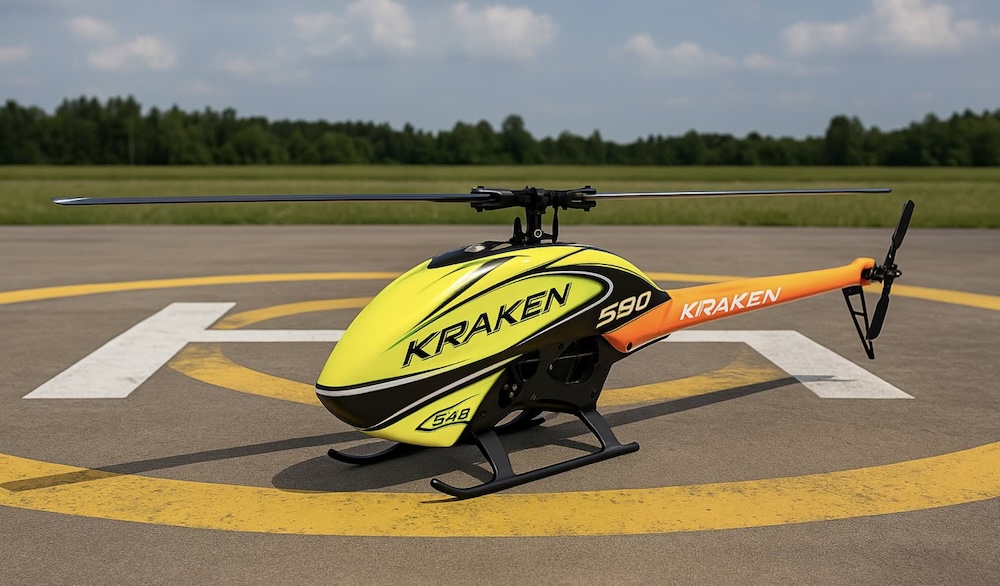
SAB’s Kraken line is famous for sleek enclosed mechanics and buttery smooth head geometry.
| Key Spec | Detail |
|---|---|
| Ready-to-fly | Kit with motor and ESC |
| Rotor diameter | 1320 mm |
| Battery | 6 S or 12 S 4500 mAh LiPo (not included) |
| Flight time | 5–7 min aggressive 3D |
| Weight | 3450 g dry |
The 580 Sport keeps that feel but uses less pricey layout parts and a single battery option, making maintenance simpler. Pilots love the low parts count and quick belt tension adjustment.
Pros
- Unique closed tail boom resists boom strikes
- Runs on one six cell pack to cut battery cost
- Low parts count equals faster repairs
Cons
− Canopy paint chips if you rush battery swaps
− Stock gear ratio prefers 1800 RPM plus head speed tuning
4. Roban UH-60 470 or 700
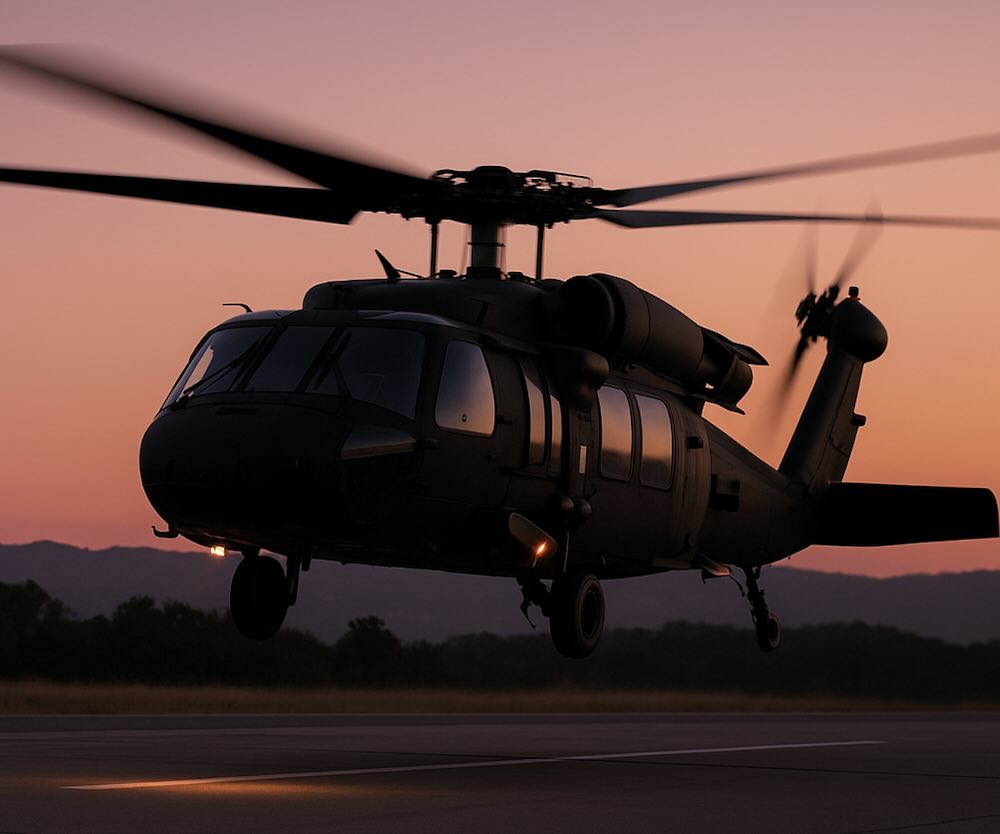
This big Black Hawk is a dream build for scale fans. The fiberglass fuse arrives prefinished with sliding doors, rivet detail, and a full cabin.
| Key Spec | Detail |
|---|---|
| Ready-to-fly | Almost ready, needs mechanics and electronics installed |
| Rotor diameter | 1580 mm |
| Battery | 12 S 5000–6000 mAh LiPo (not included) |
| Flight time | 6–8 min scale cruise |
| Weight | About 7200 g finished |
Drop in any 700 class mechanics, wire up navigation lights, and you have a showpiece that can still manage gentle loops with the right head speed.
Pros
- Impressive presence in the air, over five feet nose to tail
- Plenty of room for cockpit seats and soldiers
- Heavy weight smooths out gusty wind
Cons
− Assembly time is measured in weekends, not hours
− Needs a van or SUV for transport
5. Blade Fusion 330 or 550 BNF
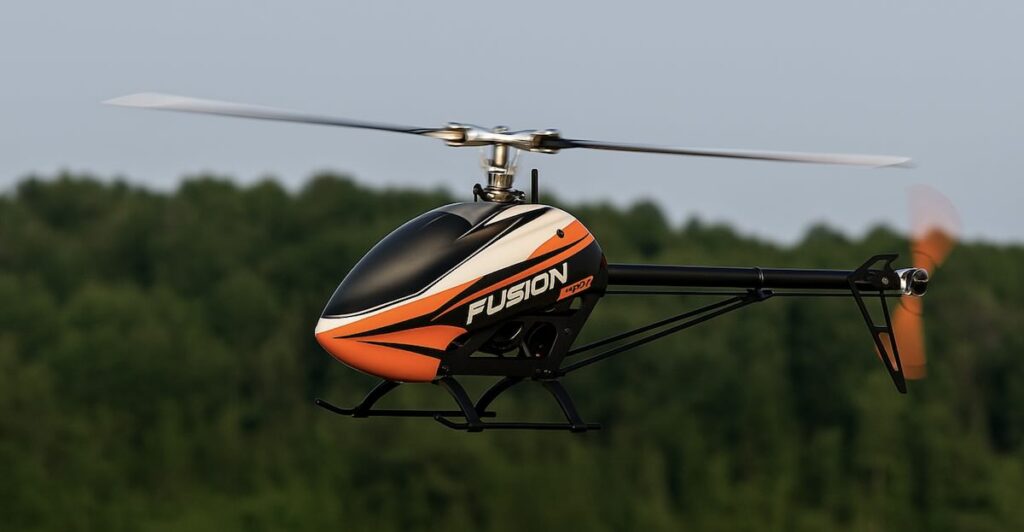
Blade’s Fusion 550 bundles a robust aluminium frame with Spektrum’s Smart ESC and telemetry. Bind to any DSMX transmitter and get live pack voltage and current on screen.
| Key Spec | Detail |
|---|---|
| Ready-to-fly | Bind and fly for Spektrum radios |
| Rotor diameter | 1245 mm |
| Battery | 6 S 5000 mAh LiPo (not included) |
| Flight time | 5–7 min sport flight |
| Weight | 3650 g ready |
The carbon blades track perfectly out of the box and the latest AS3X gyro holds the tail rock solid even in gusty conditions.
Pros
- Telemetry for pack voltage, temps, and RPM without extra modules
- Pre-loctited frame, bolts stay tight after hard flights
- Support from Horizon Hobby if you crash on day one
Cons
− Needs Spektrum radio gear only
− Tail fin is thin carbon, can split on rough landings
6. FLYWING UH-1 Huey V4 GPS
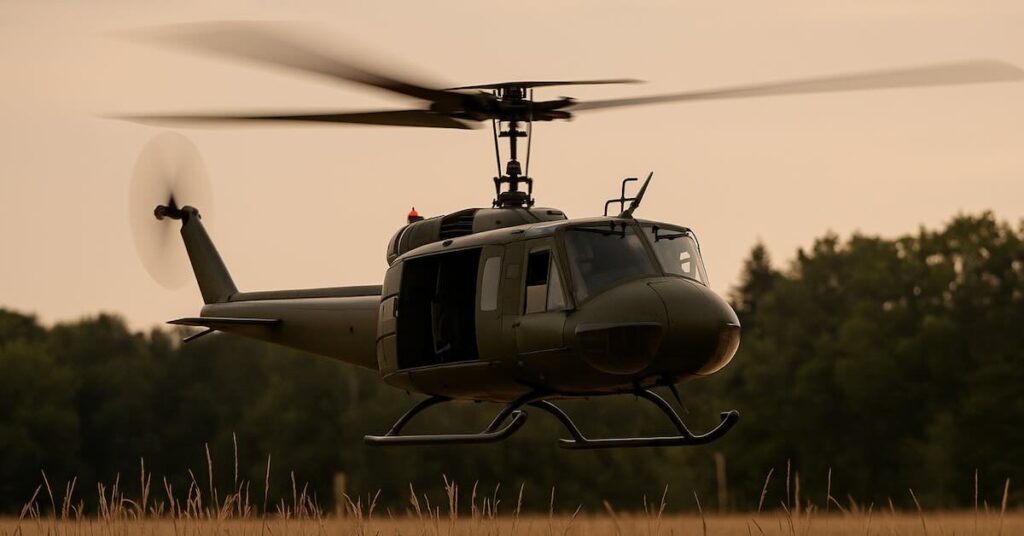
The Huey ships completely assembled with a matched radio, charger, and even a spare rotor set. It’s a cool military style helicopter with quality to back it up.
| Key Spec | Detail |
|---|---|
| Ready-to-fly | Yes, radio and battery included |
| Rotor diameter | 780 mm |
| Battery | 6 S 2600 mAh included |
| Flight time | 10 min gentle scale circuits |
| Weight | 1400 g with battery |
GPS assisted hover lets newcomers fly a scale chopper without sweating collective management. Flip to stunt mode once confident and the Huey will bank hard enough for photo passes.
Pros
- True plug and fly experience in one box
- GPS lock and return to home reduce risk
- Iconic Vietnam era look with sliding side doors
Cons
− Plastic skids bend on heavy touchdowns
− Limited spare parts in local hobby shops
3 Types of RC Helicopters
Quickly, let’s touch on what distinguishes a toy RC helicopter from a high-quality remote control helicopter for adults.
Like other toys like RC cars and trucks, RC helicopters for adults tend to be for serious hobbyists and competitors. They are generally larger, made with higher quality materials, have longer flight times and ranges, and more frequency channels.
Most of the RC helicopters we’ll be referring to from here on out will be adult models, more hobby grade, and are not “cheap” toys.
Micro Coaxial Hobby Grade
If your interest in hobby-grade RC helicopters stems from a fascination with real helicopters, the coaxial just might be the perfect choice for you. These helicopters look and operate like conventional helicopters because they use swashplate cyclic controls.
They’re also terrific for beginners because they are easy to fly. Many of the skills you learn flying a coaxial heli are transferrable to single rotor hobby grade remote-controlled copters, which can be more challenging. These fun, easy-to-use choppers are great for any age or experience level.
Micro Single Rotor Fixed Pitch Hobby Grade
Single Rotor Fixed Pitch RC Helicopters have main rotors that remain at a fixed or constant angle. You control the helicopter’s lift by varying the speed of the engine/motor.
These RC copters are easy-to-use and simpler in style with fewer parts. That’s why lots of beginners start with Single Rotor Fixed Pitch helicopters when getting into hobby-grade flying.
Single Rotor Collective Pitch Hobby Grade
Single Rotor Collective Pitch RC helicopters have a reputation for being hard to fly for a reason. In the past single rotor collective pitch was the only option there was. Newer models like micro coaxial and quad rotor have auto-leveling stability modes.
These RC helicopters are fun to work up to. Mastering the skill takes time and practice, but learning to successfully fly them can be extremely gratifying. Flying UFO
How much does an average RC helicopter cost?
How much are you willing to spend on your RC Helicopter? If you’re purchasing for a child or buying your first copter as a beginner, you may wish to buy something durable yet affordable.
If you’re a serious hobbyist thinking about taking your skillset to the next level, you may be wondering what kind of price range you will be upgrading into.
1. Low Priced RC Helicopters
Anything below $50 is going to be considered an inexpensive hobby RC copter or a toy-grade RC copter. Small, indoor helicopters are relatively inexpensive, starting as low as $25.
We don’t cover toys in this article, because toys are cheap and toys break fast. Keep in mind that low-cost helis are relatively fragile and prone to damage. You’re also unlikely to find replacement parts for low-cost remote-controlled helicopters.
2. Moderate Grade RC Helicopters
Durable, hobby-grade helicopters run anywhere from $50 to $400. There’s a lot of room to play in this price range. Those who want a strong, long longing RC helicopter should opt for a hobby-grade RC copter. On average, the most expensive will skew above $300.
3. Hobby Grade RC Helicopters
Our article focuses here. Like any hobby, the sky is the limit when it comes to how much you can spend. Serious hobbyists have been known to spend thousands on custom high-powered RC coppers — like the owner of the most expensive RC helicopter in the world.
The power used to run your RC helicopter also impacts the price. Fuel-powered Collective Pitch helis, for example, easily run $1,200 and up. Furthermore, if you choose to purchase only the highest quality parts and components, the numbers can add up even faster.
Getting Involved in the RC Helicopter Community
There is a wide world of RC hobbyists out there. Like any hobby or sport, there are people who live and breathe RC hobbies — and they’re some of the nicest people around!
There are all kinds of RC helicopter forums and Facebook groups online where you and other hobbyists can meet and swap knowledge. Check out sites like Meetup.com to find local groups in your area.
Participating in Competitions
Did you know almost every weekend of the year there is an RC Helicopter competition, festival, or jamboree taking place somewhere in the United States?
Find like-minded hobbyists and share your passion for remote-controlled helicopters by getting involved.
The International Radio Controlled Helicopter Association hosts the IRCHA Jamboree, the world’s largest RC helicopter competition. This event draws hundreds of RC pilots from around the world each year. Look online for events happening near you.
Let’s Finish Up with a Few FAQs
Q: Are these RC helicopters suitable for beginners?
A: No. These are high-performance, hobby-grade helicopters designed for experienced pilots. Beginners should start with smaller, stabilized coaxial or fixed-pitch models before moving to collective-pitch helis like these.
Q: What kind of transmitter do I need?
A: Most kits require a programmable 6+ channel transmitter (e.g. Spektrum, Futaba, or RadioMaster). Some models include bind-and-fly options but usually assume you already have compatible gear.
Q: How hard are these to build and maintain?
A: If you’re comfortable soldering, adjusting swashplates, and balancing blades, you’ll be fine. Some models ship RTF (ready-to-fly), but most require setup, calibration, and routine maintenance like belt tensioning and gear inspections.
Q: Do I need to register these with the FAA?
A: Yes, in the U.S., any drone or RC aircraft over 250g used outdoors requires FAA registration—even for hobby use. Some scale helicopters on this list are well over 1,000g.
Q: Can I fly these in a neighborhood park?
A: Technically yes, but it’s not advised. These models are loud, powerful, and can be dangerous in public areas. Use a flying club field, open farmland, or designated RC airfields for safety.
Q: What happens if I crash one?
A: Crashes are part of the hobby. Most kits have replaceable parts and strong manufacturer support. However, repairs can be expensive, so invest in a flight simulator or train on a smaller heli first if you’re new to collective pitch.
You might also like...
Parents Love These 7 Electric Go-Karts for Kids
The 9 Most Expensive RC Cars in the World
Parents Love These 7 Electric Dirt Bikes for Kids in 2025
Beginner's Guide to Collecting Military Toys and Replicas
Slot Cars vs. RC Cars: Which is Best for You?
The 6 Fastest Remote Control Cars in the World
Ride-On Car Safety Checklist 2025: 12 Must-Know Tips Before You Buy
Ride-On Cars vs. Pedal Cars: Which is Best for Your Child?
Top 10 Remote Control Toys for Christmas 2025
Submit your review | |
I got the Huey and loved it. Anyone not willing to spend as much as their iPhone on their copter, probably isn't serious about it IMO.

